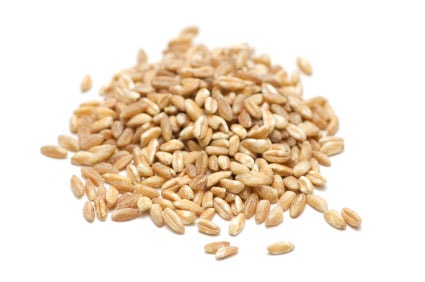
Written By: Owennie Lee, RD
Title: Registered Dietitian
Alumni: University of British Columbia
Last Updated on:

Although many of us from the modern world may not have heard of spelt, it is one of the first grains ever grown in human history. Spelt (Triticum spelta) is an ancient and distant cousin of modern wheat (Triticum aestivum). It was a staple grain in the ancient Greek and Roman civilizations, but modern wheat gradually took over since it was easier to process than spelt, which has a tough hull. In recent years, however, spelt has been making a comeback due to its unique nutty flavor and its higher nutrient density compared to wheat.
Table of Contents

Compared to wheat, spelt is higher in protein and fiber. Although both wheat and spelt contain gluten and are not appropriate for those who have celiac disease, the type of protein in spelt is quite different from that in wheat, and may be tolerated by people who are allergic to wheat protein. Rich in fiber, spelt, like other whole grains, has been shown to reduce blood pressure and risk of heart attack. A diet that is high in whole grains (such as spelt) may also be protective against cancer, cardiovascular disease, diabetes, and obesity, according to a meta-analysis done by Dr. Joanne Slavin of the University of Minnesota in 2004.
Increasing in popularity, spelt is gradually making its way back to the mainstream scene. It is generally available in its whole grain and flour forms. Pastas and bread made entirely from spelt can also be found. Spelt grains can be stored in an airtight container in a cool, dry, dark place. Spelt flour, however, should be kept in the refrigerator to preserve its nutty flavor and nutritional value. To prepare spelt grains, rinse thoroughly under running water and remove any visible dirt. Then, soak the grain in water overnight. Drain, rinse, and add three parts water to one part spelt. Bring the mixture to a boil, turn down the heat, and simmer for one more hour before serving.
Alumni: University of British Columbia – Owennie is a registered dietitian with a soft spot for chocolate and coffee. She is a believer in balance and moderation, and is committed to keeping healthy eating enjoyable and fun. Owennie received her dietetics training in Vancouver, and is a member of Dietitians of Canada and the College of Dietitians of British Columbia. She has experience in a wide variety of settings, such as clinical nutrition, long-term care and outpatient counseling. Owennie has also worked for a community nutrition hotline and participated regularly as a guest radio host, where she enjoyed sharing her passion and knowledge about food and nutrition with people.
ancient grain, diabetes diet, fiber, grocery aisle, healthy every month, heart smart, protein, spelt, whole grains